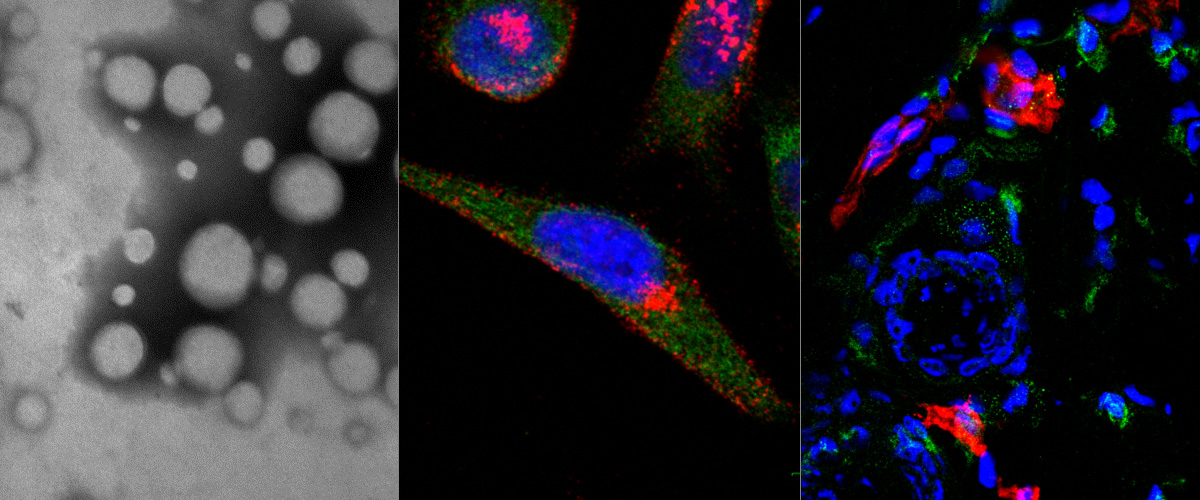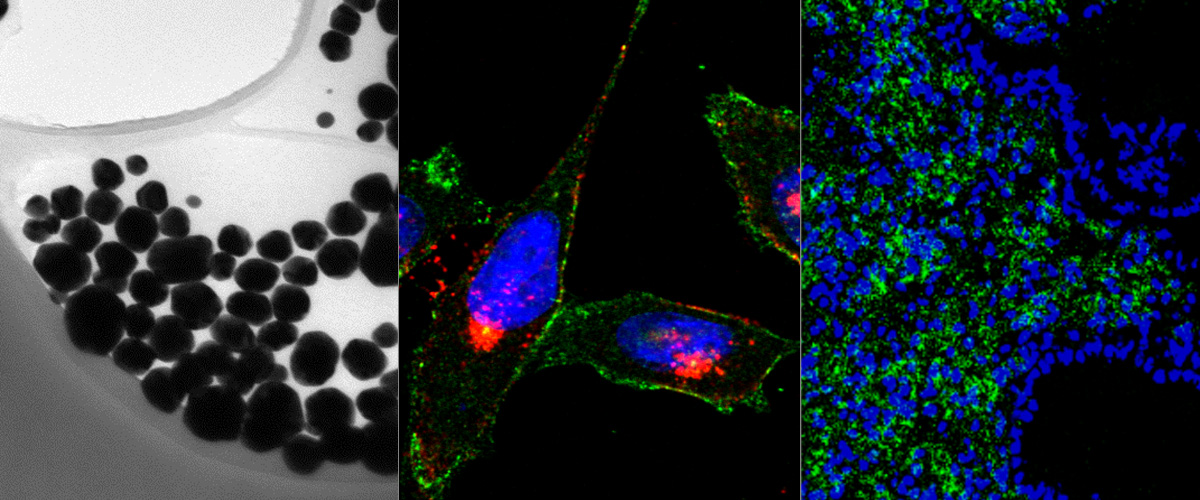News
Congratulations to our 1st year PhD students !
Recently, the work of all our three first-year Ph.D. students was recognized by prestigious awards:
Valeria Sidorenko, MSc
First prize for the MSc thesis entitled "Peptide-targeted polymersomes for cancer therapy and detection" in the Estonian National Contest for University Students, in the field of Health Research. Thesis supervisors: Dr. Lorena Simon Gracia, Prof. Tambet Teesalu.
Kristina Põšnograjeva, MSc
First prize for the MSc thesis entitled "MAL clusters and proteins of yeasts with emphasis on α-glucosidases of Scheffersomyces stipitis" in the Estonian National Contest for University Students, in the field of Bio and Environmental Sciences. This work was done under supervision of Ass. Prof. Tiina Alamäe.
Anni Lepland, MSc
Award from the Liisa Kolumbus Memorial Foundation for professional development.
Diploma in the Estonian National Contest for University Students, in the field of Bio and Environmental Sciences. Thesis supervisors: Dr. Pablo Scodeller and Prof. Tambet Teesalu.
Congratulations to all and keep up good work!!!
Talk of Prof. Teesalu at Sanford Burnham Prebys Medical Discovery Institute
On Oc. 30th Prof. Teesalu gave a Cancer Center lecture series talk “Tumor homing peptides: discovery and applications for precision drug delivery” at Fishman auditorium of the SBP La Jolla campus. The talk was preceded and followed by meetings with the SBP faculty members to discuss strategies on using tumor- and central nervous system homing peptides for development of precision drugs to treat cancer and neurodegenerative diseases.
PL1: a bispecific peptide that targets extracellular matrix in solid tumors
We report in Biomaterials the identification and development of a novel homing (affinity targeting) peptide that interacts with two landmark proteins in the extracellular matrix of solid tumors: oncofetal fibronectin extra domain B (FN-EDB) and tenascin-C C domain (TNC-C).
We used peptide phage biopanning to identify a 12-mer targeting peptide (PL1, sequence: PPRRGLIKLKTS) that selectively interacts with both TNC-C and FN-EDB. We showed that PL1-functionalized iron oxide nanoworms and silver nanoparticles home to glioblastoma and prostate carcinoma xenografts and to intradermal angiogenic neovessels induced by VEGF-driving adenovirus. PL-1 targeting can be used to improve therapeutic index of anticancer payloads - treatment of glioblastoma-bearing mice with proapoptotic PL1-functionalized nanoparticles resulted in significant reduction of tumor volume and increased survival. Importantly, PL-1 peptide nanoparticles interacted with TNC-C and FN-EDB-positive areas of cryosections of clinical glioma samples. This study suggests that PL1 peptide may have applications as a specific affinity ligand for targeted delivery of diagnostic and therapeutic compounds to solid tumors. EDB antibodies against FN-EDB and TNC-C are in clinical trials as carriers of cytokines to solid tumors, targeting of cancer with a bispecific peptide may allow for a simpler system and more uniform and robust tumor delivery than can be achieved with monospecific antibodies.
This work was performed in collaboration with the Department of Neurosurgery of Tartu University Clinics and Prof. Rolf Bjerkvig at the University of Bergen.
Link to the abstract of the publication: https://www.ncbi.nlm.nih.gov/pubmed/31374479
Elsevier open access link: https://www.sciencedirect.com/science/article/pii/S0142961219304727?via%3Dihub
PL1 IP is owned by the University of Tartu and is available for licensing.
Image: Lead author of the publication, Prakash Lingasamy (left) and Prof. Tambet Teesalu (right). Photograph: Allan Tobi.
LinTT1 tumor penetrating peptide guided nanoparticles for improved imaging and therapy of glioblastoma
In a collaborative study “Peptide-guided nanoparticles for glioblastoma targeting” published in Journal of Controlled Release we evaluated a novel tumor penetrating peptide that targets cell surface p32, LinTT1 (AKRGARSTA), as a GBM targeting ligand for systemically-administered nanoparticles. LinTT1-functionalization increased tumor homing of iron oxide nanoworms (NWs) across a panel of five GBM models ranging from infiltratively-disseminating to angiogenic phenotypes. LinTT1-NWs homed to CD31-positive tumor blood vessels, including to transdifferentiated endothelial cells, and showed co-localization with tumor macrophages and lymphatic vessels. LinTT1-guided proapoptotic NWs exerted strong anti-glioma activity in two models of GBM, including doubling the lifespan of the mice in an aggressive orthotopic stem cell-like GBM that recapitulates the histological hallmarks of human GBM.
Lead authors of this exciting and potentially translationally relevant study were Pille Säälik and Prakash Lingasamy (both Laboratory of Cancer Biology). This work was performed in collaboration with the Department of Neurosurgery of Tartu University Clinics, team of Dr. Dinorah Friedmann-Morvinski at Tel Aviv University, and Prof. Rolf Bjerkvig at the University of Bergen.
Link to the abstract of the paper: https://www.ncbi.nlm.nih.gov/pubmed/31255690
Prof. Tambet Teesalu gave an inaugural lecture entitled “Nanomedicine: big opportunities in a small world”
Prof. Tambet Teesalu gave an inaugural lecture entitled “Nanomedicine: big opportunities in a small world” in the main hall of the University of Tartu on 14.05.2019.
This establishment of a professorship in nanomedicine at the University of Tartu underlines the importance that the University attributes to this exponentially growing interdisciplinary field of medicine.
Congratulations to Hedi Hunt for successfully defending her PhD thesis!
Hedi Hunt successfully defended her Ph.D. thesis "Precision targeting of intraperitoneal tumors with peptide-guided nanocarriers" on April 18th, 2019. Her thesis dealt with the development of peptide-guided nanoparticles for therapy and imaging of peritoneal carcinomatosis. We wish Hedi good luck in her future career!
http://dspace.ut.ee/handle/10062/63502
Image: Hedi Hunt and her opponent Professor Pirjo Laakkonen PhD of the University of Helsinki (Finland) during the thesis discussion.
We look for talented M.Sc. and PhD candidates to join our lab in fall 2019
We look for talented M.Sc. and PhD candidates (molecular medicine, cancer biology, drug delivery, nanomedicine) to join our lab in fall 2019.
Apply now: This email address is being protected from spambots. You need JavaScript enabled to view it.
For more information Click Here
Dr. Teesalu has given a series of invited talks on international conferences in Europe and in the US
Dr. Teesalu has given a series of invited talks on international conferences in Europe and in the US: The 4th Brain Tumors Conference 2018: From Biology to Therapy ( June 21-23, 2018, Warsaw, Poland), Frontiers in Delivery of Therapeutics (August 21-23 2018, Tartu, Estonia), 11th European and Global Summit for Clinical Nanomedicine, Targeted Delivery and Precision Medicine, „The Building Blocks to Personalized Medicine“ (September 2 ‐ 5, 2018, Basel Switzerland), Boulder Peptide Symposium (September 24-27, 2018, Boulder, USA), workshop on self assembly and hierarchical materials in biomedicine: drug delivery, tissue engineering, sensing and safety (October 8 – 10, 2018, San Sebastián, Spain). The mission of the talks was to increase the awareness of nanomedicine and drug delivery community on the tumor homing peptides developed at our laboratory and establish new collaborations.
Dr. Teesalu (left) with Dr. Sergio Moya (the organizer of the workshop on self assembly and hierarchical materials in biomedicine in San Sebastián, Spain
New nanoparticles for detection of small breast tumors with PET imaging reported in Oncotarget
We have designed new nanoparticles that detect small breast tumors using the clinically used medical imaging modality Positron Emission Tomography (PET).
The particles are polymeric vesicles (polymersomes) made from biocompatible components polyethyleneglycol (PEG) and polycaprolactone (PCL). We found that functionalization with a tumor penetrating peptide discovered in our group ("LinTT1") boosted the accumulation of the particles in the tumor to allow sensitive detection of breast tumors modeled in mice. The polymersomes used in the study are versatile carriers that can be loaded with chemotherapeutic agents to make the drugs more selective and decrease side effects.
This work was performed in collaboration with the group of Dr. Sergio Moya at the Center of Cooperative Investigation in Biomaterials (CIC BiomaGUNE) in San Sebastian (Spain) and group of Prof. Twan Lammers of RWTH Aachen University, Aachen (Germany).
Image caption:PET images taken 48hours after intravenous injection of untargeted polymersomes and LinTT1-targeted polymersomes. The location of the tumors is marked with red arrow and both tumors had the same volume. The detection limit of the tumors using PET images was significantly lowered when using LinTT1 guided polymersomes.
Link to the paper: https://doi.org/10.18632/oncotarget.24588
Tambet Teesalu’s translational work recognized by the University of Tartu
The translational work at the Lab of Cancer Biology in 2017 was recognized by University of Tartu by awarding the head of the laboratory Tambet Teesalu the prize for research entrepreneurship.
https://www.ut.ee/et/uudised/tu-koige-ettevotlikumad-teadlased-tambet-teesalu-toomas-saat












